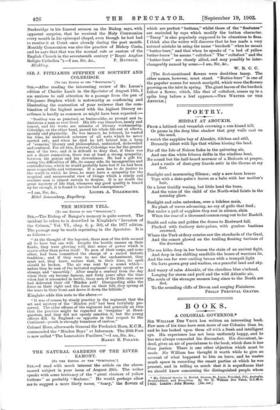THE MINDEN YELL.
[To THE EDITOR OF THE " SPECTATOR.1 SIR,—The Bishop of Bangor's memory is quite correct. The incident be refers to is described in Kinglake's " Invasion of the Crimea," Vol. VI., chap. 6, p. 302, of the 1877 edition. The passage may be worth reprinting in the Spectator. It is
as follows :—
" At the thought of the bayonet, these men of the 20th seemed all to have but one will. Despite the hostile masses on their flanks, they were glowing with that sense of power which is scarce other than power itself. To men of their corps, and none other, had been committed the charge of a sacred historic tradition ; and if they were to use the enchantment, they must not, they knew, endure that, in their time, its spell should be broken. The air was rent by a sound which— unless they be men of the initiated regiment—people speak of as strange and unearthly.' After nearly a century from the day when their cry become famous, and forty years after the time when last it resounded in battle, these men of the 20th once more had delivered their old 'Minden yell.' Disregarding alike the force on their right and the force on their left, they sprang at the mass in their front and drove it down the hillside."
Kinglake adds this note to the above :— " It was of course by steady practice in the regiment that the art and mystery of the Minden yell' had been faithfully pre- served. The elder officers of the regiment had generally an idea that the practice might be regarded as `irregular' at Head- quarters, and they did not openly sanction it, but the young officers did. In England—so opposite in that respect to the Continent—youth is strongly tenacious of custom."
Colonel Horn, afterwards General Sir Frederick Horn, K.C.B., commanded the "Minden Boys" at Inkerman. The 20th Foot is now called " The Lancashire Fusiliers."—I am, Sir, &c., HARRY B. POLAND.






































 Previous page
Previous page